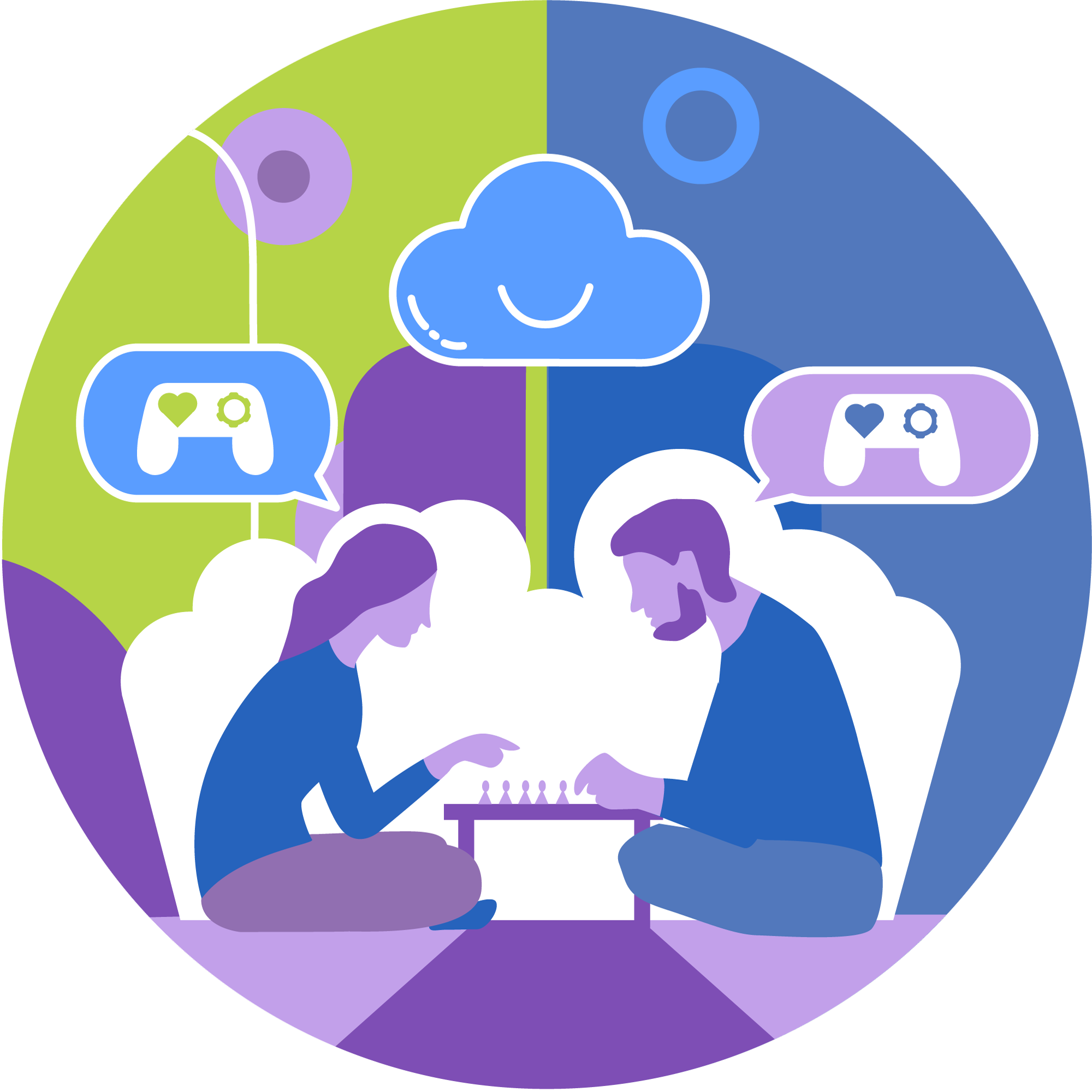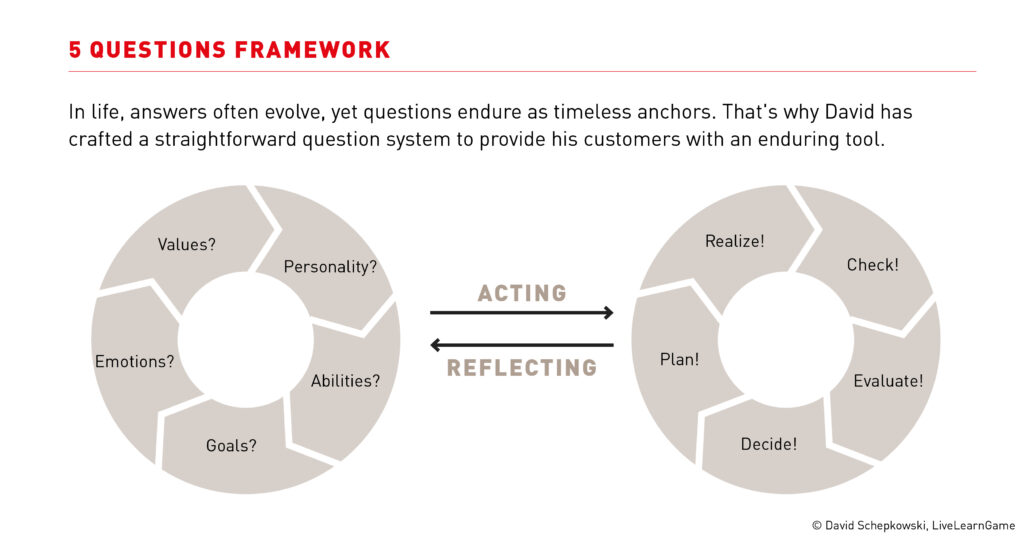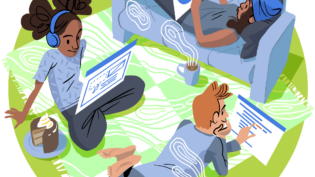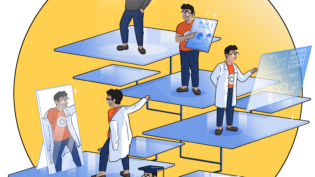
A Journey of Self-Discovery
Games and Mental Health with Interdisciplinary Research
Written by
Spring is finally here! Therefore, we want to share the sciencepreneurship story of David Schepkowski. David’s story may be familiar to many of you, as he tried to find a balance between his research, academic, and private life responsibilities while carrying different passions in his heart. Fortunately, he found a way out and became a self-determining sciencepreneur, now helping others to overcome similar struggles. He shared his journey with an open heart in the interview below. Enjoy reading!
Can you tell me about your professional background as a researcher and entrepreneur?
My journey began with a bachelor’s degree in psychology and management, leading to my initial career as a job coach. In this role, I supported people in communicating their strengths and re-integrating into the job market, oftentimes after overcoming physical or mental health issues or even fleeing war-torn countries. However, as I’m also a researcher at heart, I sought out new challenges by pursuing a PhD and later contributing to a university project about designing digital learning environments. This blend of technology, psychology, and my desire to promote living a self-determined life laid the foundation for my current path as a sciencepreneur with LiveLearnGame.
What was your goal when you started your sciencepreneurship journey? How do you find your motivation?
My goal was to embrace risk and change during a tumultuous period of my life, driven by personal challenges and the opportunity for financial support from the government as a founder in Germany. Essentially, I was motivated by a desire to utilize my experiences and skills to help other people realize their own potential. To phrase it as positive self-affirmation: “If not me, then who?” and “If not now, then when?” Having full autonomy over my work and being a role-model to my children in terms of resilience and the willingness to take risks for what you believe in, are driving factors as well.

How did Young Entrepreneurs in Science workshop affect your career choice?
I attended the workshop at a turning point of my PhD I struggled with my research topic and your workshop provided me with newfound confidence and perspectives on transforming academic pursuits into more tangible, real-world applications. It introduced me to “entrepreneurial thinking”, such as elevator pitches and prototyping, which have been an important part of communicating my own ideas and goals.
How did you transform your research topic into a startup? What is the role of mental well-being and self-determination in our lives / people in research?
My new research topic about understanding and using games to foster critical thinking skills was inspired by my personal interest in gaming and psychology. Initially, I was drawn to computer science with the aim of creating games for education, but I realized that my true passion lay in understanding human behavior. This shift underscored the importance of mental health and self-determination, principles that became central to my current work. After facing my own challenges, like depression and social anxiety before I got diagnosed with ADHD, I recognized the power of self-awareness and personal strengths. These experiences and my personal ambition to navigate a life of self-responsibility, self-acceptance, and a growth mindset, directly influence the work with my counselees.
Which also includes researchers! They often struggle with similar problems, especially „impostor syndrome”, being surrounded by so many other talented people. Prioritizing your own mental well-being and refraining from comparing yourself to others becomes crucial to avoid burning out. Fortunately, a healthy mindset, time management, and emotional regulation are all skills that can be learned. Being recently self-employed and raising two children, I also had to take a break from my own PhD endeavors to avoid overambition. Maybe an opportunity presents itself in the future to continue down that path again and it is that mindset of staying open to new possibilities that teaches you not to tie your self-worth to a certain degree or career.

Which advantages and disadvantages have you experienced in your way as a sciencepreneur? Which skills have you gained during this journey?
The main disadvantages so far have been operating on a limited budget in two highly competitive fields (life coaching and content creation) and doing everything on your own. But these can turn into advantages as time-management skills, creating content efficiently, and networking with key individuals, were part of being a scientist already for me. Especially when you are leaning more on the introverted side like I do, picking your battles and grounding yourself with the help of a close-knit support network of family and friends can save a lot of energy. As such, even when you make all the decisions by yourself, strong communication skills are always needed. Knowing what you can NOT do and when to seek help becomes a skill in and of itself. In my case, hiring someone for legal documents such as coaching contracts or data privacy to save myself time and countless headaches was well worth its money.
What advice would you give other researchers about self-employment and/or possible career paths?
My advice would be the same as I give to my counselees and is based on a framework I developed over the years to embrace self-discovery and decision-making. Ask yourself these questions: “What is important to me?”, “Who am I?”, “What am I capable of?”, “What do I want?” and “How do certain things make me feel?”. The moment you can answer these questions you will know what to pursue, as it will align with your values, personality, resources, goals, and emotions. Let me illustrate: Consider you are working a job that you think you should be happy about, but something is bothering you. You are skilled, find the daily tasks engaging enough and your colleagues are great! But maybe your work feels meaningless because your personality scores high in openness and you value innovation but the company runs on traditional values. Add parents or a PhD mentor who taught you to always play it safe to the mix and you have a recipe for burnout and anxiety to make any changes for the better.
When you are in doubt, take the smallest step you can risk, and won’t regret to find out if a certain career suits you. Otherwise, you will run the risk of living in regret having never tried it in the first place. This could mean getting in contact with people already doing what you want to do and asking them questions, getting an internship, starting out working part-time, or simply changing projects/ departments/ company location. This way I have seen computer scientists go from insurance companies into programming software for medical equipment and musicians into psychology for music therapy.
Is there anything you would like to add?
Self-employment can be incredibly fulfilling and it truly becomes what you make of it, even when you fail at times. But overcoming these challenges, for example, redefining your target audience after an unsuccessful marketing campaign also builds confidence in your abilities to navigate uncertainties. Knowing yourself, utilizing your academic skills such as always learning new things and a high tolerance for frustration, and striving for what you believe in can make previously unseen doors open up to you. Of course, I will take that advice to heart myself and for my own future plans I will try out crafting online courses, building an online-community, and interviewing experts that share my vision. Now, what prevents YOU from taking the next step in living a self-determined life as a researcher or entrepreneur
What happens next?
Check out our event calendar for upcoming workshops. Stay tuned for more updates, opportunities, and success stories!
Curious for more? Connect with David via LinkedIn or ask your questions via this email address.
Interviewer: Dilara Ekinci
Illustration: Header image AI-generated and revised by Bianca Cramer
Editor: Bianca Cramer







